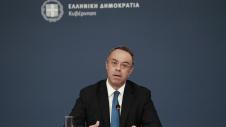The Greek economy recorded a dynamic growth in 2023 helped by the execution of a Public Investment Programme worth 11.2 billion euros -up 176 million compared with 2022- National Economy and Finance ministry said in a report.
More specifically, on a national leg, funds disbursed totaled 1.72 billion euros, on a co-funded leg, payments totaled 7.4 billion euros, while payment from the Recovery and Resilience Fund totaled 2.1 billion euros. At the same time, the EU disbursed the 3rd tranche of European funds worth 3.6 billion euros from the RRF on loans and subsidies, funds related with the achievement of landmarks of critical projects and reforms made in the country.
The initital budget of the Public Investment Programme for 2023 was raised by 800 million euros with supplementary budgets to deal with increased needs for the restoration of damages from natural disasters (450 million) and the execution of co-funded projects (350 million).
Payment demands to the European Commission totaled 4.074 billion euros, fully covering the annual target of 4.008 billion euros, significantly boosting public revenue. The 2014-2020 co-funded projects were fully executed (23.4 billion euros in public spending) exploiting every available fund. The initial budget of the programme was raised by 2.0 billion euros through REACT-EU to deal with the economic consequences of the pandemic.
National Economy and Finance Alternate Minister Nikos Papathanasis said that the Greek economy recorded significant performance in 2023 and successfully executed its Public Investment Programme. For 2024, the economy is projected to record even bigger growth helped by the exploitation of European funds and the Recovery Fund. "We continue dynamically towards a sustainable and resilient economy supporting investments and creating new job positions," he noted.








